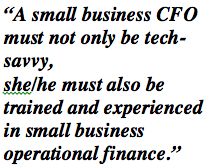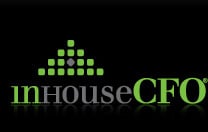Time to set the record straight.
 In the contexts being used today, Virtual CFO's (or Online CFO's) and Part-Time CFO's are very different animals. Unfortunately, wannabe CFO's are using the marketing ploy and sizzle of the words "Virtual" and "Online", and attaching CFO on the end, then going crazy with SEO experts to attract the attention of prospects. What these folks are missing in this is, being a credible small business CFO in Canada takes much more than tech-savvyness these days.
In the contexts being used today, Virtual CFO's (or Online CFO's) and Part-Time CFO's are very different animals. Unfortunately, wannabe CFO's are using the marketing ploy and sizzle of the words "Virtual" and "Online", and attaching CFO on the end, then going crazy with SEO experts to attract the attention of prospects. What these folks are missing in this is, being a credible small business CFO in Canada takes much more than tech-savvyness these days.
In addition, who ever said not having an office was a good thing?
We all know the CFO acronym stands for Chief Financial Officer. What does this truly mean in a Canadian small business context?
Every small business needs someone responsible for the following:
- Record keeping;
- Financial planning;
- Managing the financial risks of the business;
- Financial reporting; and
- Analysis of a business' data.
That's the role of the CFO. We call these roles "Operational Finance".
Most small business owners take on this role, subcontracting record keeping to a bookkeeper and year end financial reporting to a public accountant. The others, including financial reporting when it counts, during the year, are left to the business owner.
It goes without saying that having a person (other than the owner) who is trained and experienced in these skills dedicated to each of the 5 areas above will pay dividends to the business. The owner can focus on customer relstionships, increasing sales, and strategic planning.
Training and Experience
The key is training and experience.

With the proliferation of tools now available to help small business, it is imperative that a CFO for small business be tech-savvy.
However, equally importantly, operational finance is much different than public accountancy, and day-to-day experience in small business operations is a must for any person holding themselves out as a small business CFO.
Cost Effectiveness
With today's tools at both the small business owner's and the small business CFO's fingertips, accessing the skills of trained and experienced small business CFO's has never been easier, and very cost effectively. If you don't see immediate ROI from investing in a small business CFO, something has been missed in one ot more of the three key areas of tech-savviness, training in operational finance; and/or small business experience. Time to look for an upgrade.
The Small Business CFO
Adding a CFO to your small business team is a very smart decision. Make sure however that you are not getting misled by the suggestion that a virtual CFO can deliver. Remember the 3 key criteria:
- Training;
- Experience; and
- Tech-savviness.


